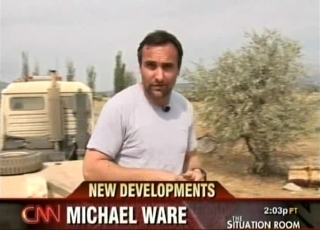TSR: "...there's no suggestion that any of this is going to change any time soon."

Length: 3:51
LARGE (44.7 MB) ----- SMALL (4.7 MB)
A piece updating the repair work on the rail bridge outside of Gori that was destroyed by Russian troops last week, as well as an overview as to how key incidents have effectively crippled the Georgian economy.
WOLF BLITZER, CNN ANCHOR: Russia says its forces will pull back to a buffer zone in the Republic of Georgia by tomorrow evening. But those troops are still seen on the roads outside of key cities. They've also dug in near Georgia's main port. And they can control the flow of oil -- giving Russia a potential stranglehold over the country.
And given a $5 jump in the price of oil only today, that helps Russia put the squeeze on the West.
CNN's Michael Ware is outside the Georgian city of Gori.
(BEGIN VIDEOTAPE)
MICHAEL WARE, CNN CORRESPONDENT (voice-over): Like this mess of iron and concrete on a rail bridge that regularly bore millions of barrels of oil headed to port, Georgia and its economy have been crippled by Moscow's occupation.
Whilst Russian units dominate just a third of the country, says Georgia's president, and mostly in pro-Russian enclaves the Kremlin says it invaded to protect from Georgian military assault, the Russian soldiers' deployment inside undisputed Georgian territory has given them command of the core of the country's infrastructure, rendering Tbilisi's pro-American government unable to function as it wants -- its police and army units like these no match for Moscow's might; its financial lifeline damaged -- reducing a country the size of America's South Carolina to a nation divided, which Georgia's national security adviser alleges was orchestrated for strategic economic effect.
ALEXANDER LOMAIA, GEORGIAN NATIONAL SECURITY ADVISER: They're trying to gain control of alternative pipelines and energy routes delivering central Asian and Azerbaijani gas and oil to the European markets through Georgia.
WARE: It's a claim Moscow would surely deny, asserting, as it has done since the conflict's beginning, that its military invaded for humanitarian reasons in defense of Russian civilians under Georgian assault in small northern enclaves. But what cannot be denied is that Russian checkpoints and armor beyond those enclaves has Russian commanders in control of Georgia's principal highway and able to disrupt the Georgian seaport of Poti on the Black Sea coast and threatens Georgia's transit of oil.
(on camera): And key to that transit is this oil pumping station just west of the capital -- a facility essential to the Georgian economy. From here, the crude oil courses through underground pipelines that skirt South Ossetia and the heart of the conflict zone. Just a short distance up this valley sit Russian tanks and what is currently the front line of the Russian occupation.
(voice-over): Further south from that front line, far from the combat, this line of craters marches across pipelines buried in the soil beneath. And while the bombings have stopped, the impact of the invasion persists -- with promised withdrawal yet to eventuate.
(on camera): The Russian military's occupation maintains its stranglehold on Georgia's economic infrastructure. Those checkpoints keep the road severed and the oil pipelines are still not operating at full capacity. But the Georgians are fighting back.
When this rail line carrying oil to the ports was blown less than a week ago, these workers moved in, laboring feverishly to lay new lines on an old bridge. But with all the work being carried out under the gaze of Russian armor on the ridge behind us, there's no suggestion that any of this is going to change any time soon.
Michael Ware, CNN, on the outskirts of Gori.
